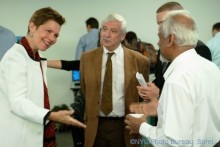NYU-Poly School of Engineering Helping Veterans Become Entrepreneurs

In its latest effort to give military veterans guidance on joining the entrepreneurial scene, New York University graduated the first class of its Veteran Entrepreneur Training program this week.
The ten-week series of free sessions and lectures took the group to the Varick Street, DUMBO, and Urban Future Lab incubators run in Manhattan and Brooklyn by the NYU Polytechnic (NYU-Poly) School of Engineering. Five teams comprised of 13 veterans held a demo day for their ideas this week, says Kurt H. Becker, vice dean for research, innovation, and entrepreneurship at NYU-Poly, who oversees the program. Plans are already in the works for a follow-up program sometime in the fall.
Four of the teams developed software-based ideas while the fifth is working to launch a startup around hardware. Becker says the teams were encouraged to do more than create mobile apps—an already crowded sector—and consider working on various IT platforms that could speak to broad audiences. Each crew is at a different stage of development, he says, but they are all working towards commercializing their ideas. “One of the teams, the day before graduation, incorporated as a company,” Becker says.
That team, called Pathfinder, is developing a software platform that curates and sorts out the different benefits and agencies available to assist veterans after they are discharged from service.
Some 25 applicants sought to get into the program, Becker says, with admissions based more on commitment to learning what it takes to be an entrepreneur and less on their existing skills. They took classes on the basics of creating and building a startup—including hiring, creating a business plan, and seeking financing—to get their ideas off the ground.
The participants in the program had varied backgrounds, he says, with some being recently discharged from service while others retired from duty years prior. Their experiences with entrepreneurship also ranged from having vague, initial ideas to a team that had been working on an idea for a year prior to getting into the program. Regardless of when they left the military, finding the right fit outside of their uniforms can take time. “One of the veterans said, ‘the transition to civilian life is almost a lifelong process,’” Becker says.
The university has reached out in other ways to encourage veterans to try their hand at starting their own businesses. The NYU Entrepreneurial Institute introduced the NYU Veterans Initiative, an advocacy organization to consolidate such services offered to students who are also veterans.
NYU-Poly developed its Veteran Entrepreneur Training program with support from the Brooklyn Chamber of Commerce, as well as funding that Assemblyman Joseph R. Lentol secured. Thursday’s demo day also brought out Loree Sutton, retired Army brigadier general and current commissioner for the Office of Veterans’ Affairs in Mayor Bill de Blasio’s administration (see photo).
Now that the first class has wrapped up, Becker says folks who run the program will review and assess how they will handle the next go-round. He would like to begin marketing the fall session in October, but no firm start date has been set. Becker has some idea already, though, for potential directions the next session could take. “I would like to see a few more hardware-oriented technology teams bringing products to market,” he says.
That will call for a different support infrastructure and access to prototyping compared with the first class, which was more software-oriented.
Going forward, he says, the classes could handle up to eight teams that average three people. Larger groups would be unwieldy and require splitting into multiple classes, he says. There is no shortage of veterans who might apply, says Becker.
“Typically, on an annual basis, there are 250,000 veterans discharged,” he says. “There are 20 million veterans out there.” Obviously not every veteran may want to create a startup, but Becker says services that help them pursue entrepreneurship could find a healthy following. “If you ran 10 of these programs across country, you could easily service once or twice a year groups of 300 people,” he says. “That would address the need that is there.”
Xconomy
(88)


